Green initiatives for a sustainable community
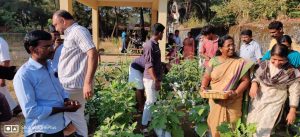
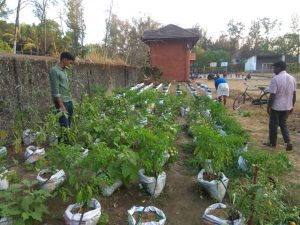
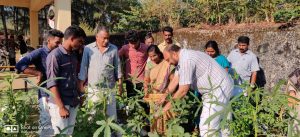
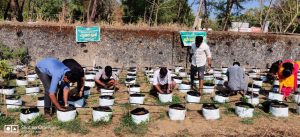
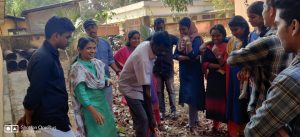
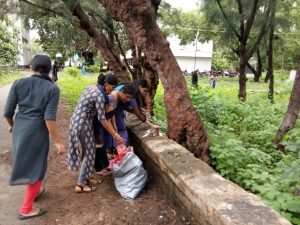
- Title of the Practice
Green Initiatives for a Sustainable Community
- Objectives of the Practice
The objective behind the practice was to orient the students and staff towards sustainable goals of development through institutionally viable green initiatives. The underlying principle of the enterprise was mutual cooperation to create tangible community linkages between the institution and the neighborhood with an aspiration to see similar models replicated by the participants in their own local communities with limited resources. The conceptual foundation of this practice relied on the ecological wisdom found in indigenous knowledge systems as well as in modern day science that humankind can survive and flourish only through maintaining interconnectedness with one another and with nature.
- The Context
The design and implementation of the practice met with some practical challenges: Firstly, it required some formal and informal deliberations to fix a suitable area within the campus for organic farming and herbal tree planting. Secondly, the unsuitability of the sandy soil of the coastal region for cultivation presented some difficulty. Thirdly, considering the fact that most of the students were day scholars who were mostly unavailable after college timings, consistent student involvement had to be ensured beforehand. Fourthly, a lack of expert knowledge in farming and related matters necessitated external guidance, and fifthly no funds were available for the institution for the easier execution of the project. Sixthly, finding a local market for selling the produce was crucial. Finally, the farming had to be undertaken without the use of plastic, and any non degradable waste generated had to be processed in an environment friendly manner.
- The Practice
The cultivation of an organic vegetable garden was done in two phases under the leadership of NSS volunteers. The plot of almost one hundred square feet for the garden was laid near the main entrance of the college for maximum visibility, involvement and ease of supervision. The Krishi Bhavan nearby, a wing of the Department of Agriculture on request extended their expert guidance during every stage of the cultivation, and following their advice drip irrigation method was adopted for effective water management. The first phase started in November and the crop was harvested in January followed by a local sale of the produce by the students themselves. Altogether, the plot yielded vegetables for some four harvests which were all sold locally. The second phase, started by the end of January, ended in March, but the outbreak of Covid-19 made it impossible to hold sales. Hence, the vegetables were provided to the community kitchen in the neighborhood. Concerns of plastic waste management with regard to the farming and selling proved to be minimal, and besides a system of plastic waste disposal was put in place through the Vettom Gramapanchayath Shuchithwa Padhathi , a project of the governing local body funded by the government. The plastic waste in the campus was collected by the workers of this project and effectively processed and disposed .The initial steps for another green initiative, planting herbal trees, were also set in motion with a request for permission submitted before the Forest department. As the project required clearing some Casuarina trees in the campus, their prior permission had to be obtained. . Discussions for dry land paddy cultivation in the campus too were initiated with the Krishi Bhavan. All of the green initiatives received consistent supervision and assistance from the NSS Programme coordinators of the college. Today, in the Higher Education Sector in India experiential learning is valued over mere theoretical knowledge; a good evidence for this is Ability Enhancement Course/ Audit Course which are mandatory for many an undergraduate and post graduate programmes. In the syllabi of University of Calicut to which the college is affiliated, it is customary to include an audit course on Environmental Studies. It would be in the best interest of the students if such a course was supplemented with an opportunity for hands-on-training through organic farming and cultivation. Perhaps, environmental knowledge and values that endures are best imbibed on ground.
- Evidence of success
The organic farming was a success in the first phase. The vegetable yield was large enough for four successive harvests and brought a modest profit. The profit was in turn utilized for starting the second phase of cultivation in a larger area. The collaboration with Krishi Bhavan enhanced the success as they lend the expertise and a small financial assistance to the project. Enthusiastic participation of the other students in the programme apart from the NSS volunteers, including the College Union, showed that the programme was greatly appreciated. Even though the second phase of the programme was not as huge a success financially as the first phase, yet the fact that we were able to contribute to the community kitchen during the pandemic remains a gain. The vegetables were also bought by the staff and the local Kudubhashree unit who ran the college canteen which affirmed their goodwill and cooperation towards the project. Preliminary discussions with Krishi Bhavan on dry land paddy cultivation indicated their willingness in partnering with the college on future projects. The positive reviews and cooperation received for the project suggest that these and similar initiatives can be undertaken by the institution on a larger scale successfully.
- Problems encountered and resources required
One of the main problems encountered was the lack of sufficient funds for the organic farming programme. It was difficult to take care of the garden during vacations as the students and staffs were not available. Planting of herbal trees in the campus got postponed because of the delay in procuring permission from the Forest department due to lengthy official procedures, Soon after, the unexpected outbreak of Covid 19 caused the project to be set aside along with the other one on dry land paddy cultivation. Implementation of the practice required the pooling together of human, natural and financial capital available to the institution to promote a model of sustainable living.
